Issue/Volume: 19/02


Solidaridad India Strengthens Partnership with Nayara Energy
On 3 May 2024, Solidaridad India's Country Manager, Monika Khanna, and Senior Manager - Gujarat, Sanjeev Rathod, participated in the CSR Leadership Meet organised by Nayara Energy. The meeting was led by Nayara Energy's Executive Chairman Prasad K Panicker, along with Deepak Arora (President, Public Affairs), Vikas Patel (Lead CSR - Retail), Avinash Rawal (Deputy General Manager - CSR), and Dr. Nitish Ghadage (Sr. Manager - CSR) from Nayara Energy.
This collaborative meeting brought together Nayara Energy's CSR partners working across various critical areas in the Jamnagar region. Here, Solidaridad is implementing an integrated programme that leverages agricultural technology and promotes regenerative agricultural practices to transform farming – from subsistence to enterprise development. Partners shared their successes, challenges, and ongoing efforts to create a positive impact in the community. The focus on inclusion, innovation, and measurable impact resonated throughout the discussions, highlighting the shared values between Solidaridad and Nayara Energy. This collaborative spirit promises to help the two organisations make even greater strides towards sustainable development in the region.

Training on Financial Literacy
A one-day workshop was organised by SREC for women farmers on financial and digital literacy in the village of Nana Lakhiaya, Jamnagar on 28 May. This initiative was led by SREC field coordinator, Bhumika Solanki, in collaboration with the State Bank of India’s Rural Self-Employment Training Institute (RSETI). Amit Bhai Goswami, of RSETI, trained 20-25 women farmers, focusing on enhancing their financial and digital literacy skills.
The workshop covered a wide range of critical topics including financial planning and budgeting, savings strategies, responsible borrowing practices, and the importance of insurance. Participants also delved into the realm of digital finance, learning about various financial services that can be accessed online, as well as the different types of fraud that can occur in the digital space and how to prevent them.
Rule of 72, 114, and 144, essential for understanding how long it takes for an investment to double, triple, or quadruple, was explained providing practical examples and comparisons of returns on various savings and investment products, empowering the women farmers to make informed financial decisions.
The training was designed to equip women farmers with the essential skills and knowledge needed to navigate the financial landscape confidently and to harness the benefits of digital tools for their economic empowerment.

Gram Samruddhi Project Forges Ahead to Next Phase
The Gram Samruddhi Project has advanced to the next phase with the collaborative effort of Krishi Vigyan Kendra (KVK) and other stakeholders. This phase focuses on providing technical training on pre-sowing and land preparation for key crops such as groundnut and cotton. The training aims to cover essential aspects like soil health management, water management, maintaining soil biodiversity, integrated pest management, and integrated nutrient management.
The initiative encompasses all 27 project villages, ensuring a synchronized approach towards obtaining regenerative agriculture certification. Alongside these training sessions, a comprehensive soil testing drive is currently underway to assess and enhance soil health and productivity. This ongoing effort underscores our dedication to promoting sustainable farming practices and fostering community development.

Training on Mushroom Farming
Under the VI Smart Agri Project, the Solidaridad team organised a two-day training programme on mushroom farming, at the All Bodoland Small Tea Growers Amjuli Zone office, Udalguri on 21 and 22 May, 2024. Drawing expertise from KVK, Udalguri, the sessions meticulously blended theoretical discourse with hands-on practical exercises. This comprehensive approach is aimed at providing the participants with a holistic understanding of mushroom cultivation, covering topics ranging from substrate preparation to harvesting techniques. The training initiative prioritized the inclusion of female small tea growers from local villages, recognising their pivotal role in agricultural communities. Approximately 20 farmers actively participated in the training, signaling a strong commitment to learning and adopting alternative farming practices. By empowering participants with knowledge and skills in mushroom farming, the initiative aspires to catalyze income diversification among small tea growers. Ultimately, this endeavour seeks to bolster resilience within the agricultural sector while fostering sustainable livelihoods for rural communities in the region.”

Advancements in the Leather Project in Tamil Nadu
The month of May was marked by significant events and developments for the leather project in Tamil Nadu. As a part of the communication and visibility initiative, SREC-TN (leather) sponsored the Fashion Show organized by FDDI in Chennai. Models showcased our eco-friendly bags made from particle boards, along with an exhibition display at the event. The show attracted a large and engaged audience, providing excellent exposure which enhanced the visibility and appeal of our sustainable products.
Another key highlight of May was the inauguration of the EPB (Eco Particle Board) unit, led by our esteemed woman entrepreneur, Ms. Sher Banu Mehdi. The inauguration ceremony on 09 May, was graced by the presence of Natasha and Simone from PISIE. A brochure, conceptualised and designed by the Solidaridad-leather team- featuring all the articles made from leather boards was showcased.
Later that evening, a seminar was held for the stakeholders of leather clusters from Pallavaram, Ranipet, Ambur, and Vaniyambadi, in Chennai. The seminar focused on solid waste management and transformation in the tanning sector.
In addition to these events, the month of May also saw the implementation of two operational health and safety interventions in tanneries located in Pallavaram, Chennai. Over 110 tannery workers participated in these sessions. Through pre-assessment and post-assessment forms, it was observed that there was a heightened awareness of occupational and health risks amongst the respondents along with a greater likelihood of applying the learnings in their workplaces.
Marked by significant events, stakeholder engagement and international representation, May was a month of progress and collaboration for the leather project in Tamil Nadu-underscoring the project’s commitment to circularity, safety and innovation in the leather industry.

Training on Pre-Kharif Planning
Training on pre-kharif planning was organised by Solidaridad at its resource and training centres in Dhamangaon and Talegaon clusters, Amravati district on 16 and 17 May 2024.
Agriculture experts from Solidaridad discussed the land preparation for the kharif crop, and good agricultural practices, use and preparation of compost and minimum tillage. Preparation of pheromone traps from unused plastic bottles that helps reduce the plastic waste and provides a low-cost solution to insect and pest attacks was demonstrated.
Farmers were trained on the use of IoT based information in agriculture, importance of equipments installed in the field to prepare agri advisories and plan their farming activities. Smart Agri mobile application and missed call facility that aids farmers in decision making was also explained.
Carbon sequestration and climate change was also discussed with the farmers. Biochar was introduced with the farmers which they found to be an important and low cost solution for improving soil organic carbon.

Training at Hinganghat Resource and Training Centre
On 16 May, a farmers training was organised at the Hinganghat resource and training centre, Wardha Block, Maharashtra. Agriculture experts from Solidaridad guided the farmers on topics of agricultural importance such as – land preparation, zero tillage practices, benefits of mix crops, border crop, buffer zone, low-cost cultivation practices, organic input preparation, seed germination and treatment under sowing preparation, pest control, nutrition and water management, drudgery reduction in farm work, compost preparation by using farm waste.

Farmers Training at the State Resource Centre, Nagpur
State Resource Centre is a platform where agriculture experts interact with the farmers from different program locations and build their capacity on different agricultural topics. Farmers often learn from their fellow farmers during the interactions.
On 9 May, a farmers' training was organised at the State Resource and Training Centre, Kalmeshwar block, Nagpur, Maharashtra. Solidaridad team guided farmers on Smart Agri Project, equipment’s installed-use of Iot devices for real time monitoring of crop, irrigation scheduling and weather conditions which helps farmers to make informed decisions about planting, irrigation, and pest control, making farmers more resilient to ecological poverty. Farmers were guided on the Smart Agri mobile application which helps farmers to get advisories on a weekly basis and the missed call alert facility.
Importance of Soil testing was discussed during the training, making farmers understand about the nutrients their soil will need in proper ratio to get a better yield. Topics like water conservation techniques and good practices were also discussed during the training.

Training in Convergence with Government Departments
Solidaridad conducted training in convergence with Maharashtra State Seeds Corporation -Mahabeej in Sonargaon Khunkar Village, Wardha Block, Maharashtra. The training was focused on preparing farmers for the upcoming Kharif season and making them resilient towards ecological poverty and enhancing agricultural productivity.
Recognizing the crucial role of soil health in determining crop yield and quality, the training highlighted soil testing and nutrient management. Farmers were educated on the importance of soil conservation measures such as contour plowing and cover cropping to minimize erosion and improve soil health.
Mahabeej officials-oriented farmers on seed treatment, highlighting the significance of using high-quality seeds and adopting proper treatment methods to control pests and diseases. Farmers were introduced to various seed treatment practices such as using bacterial inputs like Azotobacters, KMB and PSB. Interactive session between the farmers and officials also taken place during the training.
Another training was conducted in Khubala village in Nagpur in convergence with Krishi Vigyan Kendra. Recognizing the critical role that women play in agriculture and critical health issues they face, women farmers were guided on health and nutrition. Women farmers and entrepreneurs were oriented on network building to sell their produce, yield increase, new technology to improve their farming activities which includes Smart Agri app for advisory, market places and empowering women with knowledge for decision making.
Income generating activities like mushroom farming, good agriculture practices were discussed during the training.

Training on Industrial Safety & Chemical Management System
On 01 May, in commemoration of World Labour Day, our Panipat team undertook a significant initiative to enhance industrial safety and chemical management system awareness among workers in four prominent textile industries in Panipat, Haryana.
The training sessions, aimed to equip workers with essential knowledge concerning industrial safety and chemical management, underscored the importance of fostering a culture of health and safety within the workplace, emphasizing the well-being of all employees.
The event witnessed active participation of over 200 workers, who enthusiastically engaged in the training sessions. Their eagerness was palpable as they immersed themselves in the discussions and activities designed to enhance their understanding of safety protocols and hazard prevention measures.

Celebration of World Agri Tourism Day
Solidaridad observed World Agri Tourism Day on 16 May 2024 at the Nico Roozen International Centre of Excellence for Regenerative Agriculture, Madhya Pradesh. Local farmers participated in the event, where they gained valuable insights on the scope, potential and benefits of agritourism, effective marketing strategies to attract visitors to farms and how to integrate sustainable practices in agritourism. In addition to this, there were also interactive tours where the participants immersed themselves in hands-on experiences with existing agritourism setups, including petting cows, multi cropping demonstrations, and more. The event was capped off with an engaging Q&A session, involving a dynamic exchange of ideas and knowledge between the farmers and the Solidaridad team. "We want future generations to explore new opportunities while continuing our agricultural traditions. This initiative provides a great avenue for growth, and we are excited to be a part of it," said Mahesh, a farmer from Sehore, who attended the event.

FPO Workshop at Smart Agri Hub
Under the banner of the Smart Agri Project, a comprehensive two-day workshop was organised at the Smart Agri Hub in Bhopal on 10 and 11 May. The workshop, titled "Workshop on Self-Sustainable Rural Enterprises Services Model and the Role of Agriculture Experts and Smart Agri Hub," was attended by twenty-five agricultural experts from diverse geographical regions within the Smart Agri Project in Madhya Pradesh and Rajasthan. Discussions on Agri experts' pivotal role and the rural enterprise model were followed by updates on user fee activities and insights from fieldwork. Dr. Suresh Motwani, GM Solidaridad outlined the Smart Agri Hub's future direction, with team members detailing crop-specific problem-solving for the upcoming Kharif season. As the workshop concluded, essential mechanisms were put in place to strengthen the Smart Agri Project's impact. This included implementing a region-wise advisory system and a district-wise user fee service delivery model to improve operational efficiency and provide specific support to rural communities. Furthermore, post-assessment tests were conducted, followed by a thorough feedback session to evaluate the workshop's effectiveness and guide future initiatives.
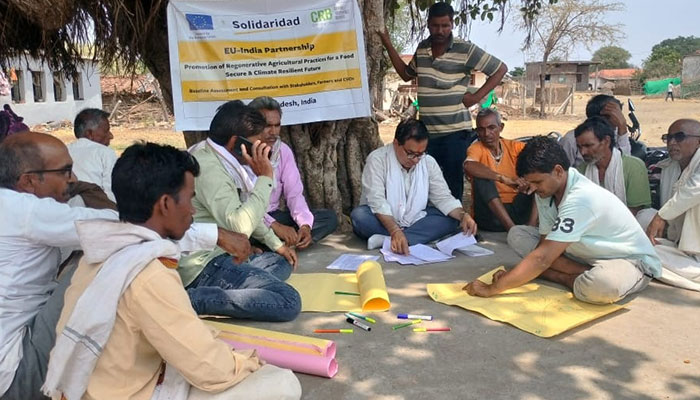
EU-Solidaridad Initiative in India
With the support of the European Union, Solidaridad is implementing a multi-year programme to promote regenerative agricultural practices in the vegetable oil supply chain in Madhya Pradesh. This initiative aims to engage civil society organisations (CSOs) in EU-India policy dialogues and support the Global Gateway Strategy in India. A pilot programme will target 35,000 smallholder farmers (10,000 female and 25,000 male) and industry players to demonstrate regenerative agricultural practices. The outcomes will inform policy papers on regenerative agriculture in the vegetable oil sector. CSOs will be empowered to participate in policy dialogues, supported by a multi-stakeholder platform to facilitate networking and collective actions. The programme will identify policy gaps and organise roundtables and consultations to develop three white papers on EU-India partnership priorities.
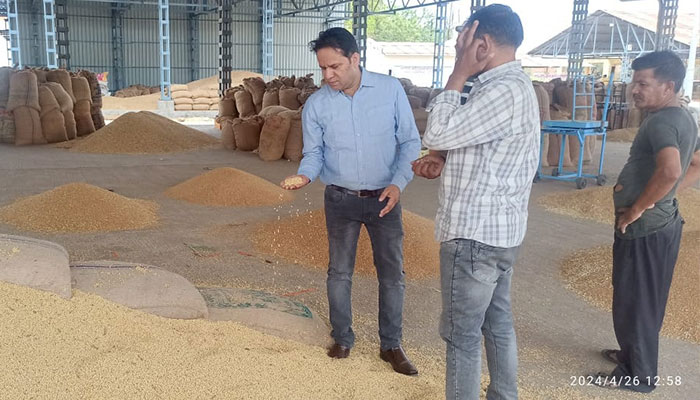
Empowering Dewas Farmers: Solidaridad and VIPPY Industries Partnership
The Dewas farmer producer organisation (FPO), supported by Solidaridad, is revolutionising soybean procurement in the Dewas Mandi. By purchasing soybeans directly from local farmers, the Dewas FPO ensures fair pricing and ethical procurement practices. VIPPY Industries, a prominent partner of Solidaridad, plays a crucial role by procuring these soybeans from the FPO. This collaboration guarantees farmers receive a price that is 50-60 Rs higher than the usual market rate, significantly boosting their income and livelihood. To date, 200 metric tons of soybeans have been procured through this initiative, exemplifying a successful model of fair trade and sustainable agriculture. This partnership not only enhances the economic well-being of farmers but also promotes transparency and integrity in the supply chain.

Nutritional Health and Wellness for Women and Girls Gets a Boost
To elevate the nutritional status of women and adolescent girls in Cuttack, Odisha, the promotion of nutrition gardens has emerged as a transformational initiative. Under the Smart Agri project, 50 nutrition gardens have been developed in the city to support communities with a high level of food security, healthier diets, and a culture of self-sustainability. By advocating the cultivation of a variety of vegetables (such as tomatoes, cauliflowers and beans), the ‘Circular Model’ of nutrition gardens has especially proved to be helpful in addressing specific nutritional deficiencies and improving the overall health of the targeted communities.
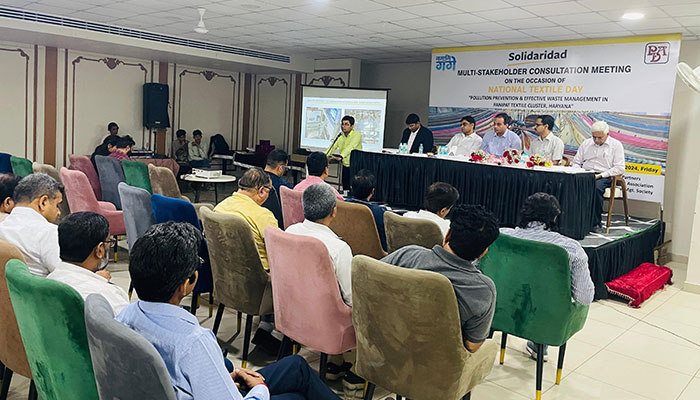
Stakeholder Meet in Panipat
For the past two years, Solidaridad India has led a transformative project in the Panipat Textile Cluster, aimed at tackling pollution and promoting optimal resource utilization under the vision of the National Mission for Clean Ganga (NMCG). On 03 May, a stakeholders' consultation meeting was convened, bringing together key players including representatives from the Panipat Dyers Association, Haryana Pollution Control Board (HPCB), and prominent figures from the Panipat Textile Cluster. The meeting focused on facilitating the exchange of innovative strategies for pollution prevention and the judicious use of water resources, crucial for sustainable development in the textile industry. Insights and perspectives from industry officials were gathered, fostering a collaborative approach towards implementing sustainable practices.
The stakeholders' meeting served as a platform to celebrate achievements and chart a course towards further advancements in reducing pollution levels and optimizing natural resource consumption within the Panipat Textile Cluster. With guidance from the HPCB and support from the NMCG, the project continues to pursue its objectives steadfastly.
The meeting concluded with a renewed commitment from all stakeholders to continue working towards a cleaner and more sustainable future for the Panipat Textile Cluster, aligning with the spirit of National Textiles Day.
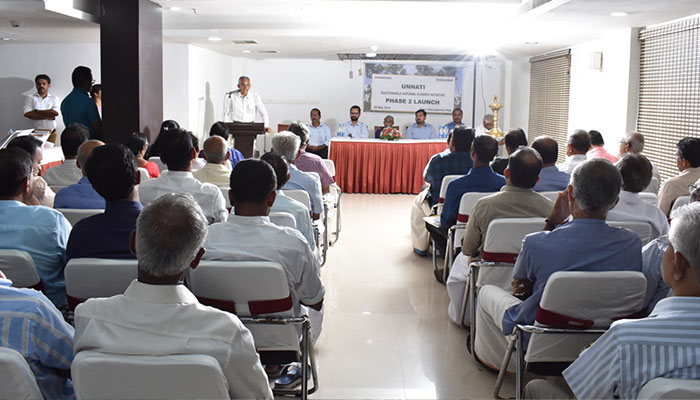
Launch of UNNATI- Sustainable Natural Rubber Initiative- Phase 2
Phase 2 of the Unnati (Sustainable Natural Rubber Initiative) project was launched on 29 May 2024 in Pala, Kottayam, Kerala with the support of Bridgestone India. Sheela Thomas, IAS (Retd.), Chairperson & Managing Director, Kerala Rubber Ltd. inaugurated the event. An overview of Phase 2 was shared by Sreerag P P, Programme Manager, Solidaridad and Bridgestone’s perspective by Saiful Haque, Lead CSR Grants Programme. A talk on labour welfare schemes was delivered by Binu Mathew K, Assistant Director, Labour Management, Rubber Board, followed by felicitation from K G Johnson, Dy. RPC, Rubber Board, Pala. The event was attended by more than 70 participants including 55 Rubber Producer Society Presidents and lead farmers.

Redefining Farming
Amiya Ranjan Nayak, a smallholder farmer from Jalasarpaur Gram Panchayat district Cuttack Odisha, found himself on an innovative path when he became a part of the Smart Agri project, seven months ago. As the project reached out to him, he seized the opportunity to redefine his farming approach. He was imparted training on green gram cultivation at Solidaridad and Sarat Kar & Anima Kar Foundation Centre of Excellence, Bantala, Cuttack.
Opting for a departure from the conventional methods, Amiya chose to cultivate green gram across one acre of his land. While his peers stuck to the traditional practices, he started a different course by embracing line sowing for his green gram crop. Before sowing the seeds, he treated it through rhizobium and PSB to prevent diseases and pest attacks. He applied Jibamurta & humic acid after 15 days of sowing and Agneystra after one month as a precautionary measure to mitigate pest attacks.
Amiya's vision stretched beyond mere cultivation; he envisioned a harmonious ecosystem where his crops thrived naturally. By opting for line sowing, he ensured ample space between the rows, facilitating the application of bio-fertilizers and pesticides. The typical yield for an acre is usually around 1.5 to 2 quintals, but post harvesting he received a yield of 4 quintals from his field. He expressed his gratitude to the Smart Agri project for educating him on organic cultivation practices for green gram, which he believes resulted in a bumper yield. He's eager to share these techniques with his fellow farmers.

Purva Dixit, joined us in May 2024, as a Programme Manager in our EU Project in Madhya Pradesh.
Purva is a seasoned professional with more than nineteen years of work experience in the developmental sector. She brings hands-on experience in programme implementation, M&E, impact assessment, training and development, formation of SHGs, corporate sustainable activities, women nutrition, women entrepreneurship, gender, etc.
She was also involved in impact studies with FAO & IWMI on Agriculture Water Management and disseminated the findings at various levels.
Previously, she had worked with Ranbaxy Community Health Care Society, International Development Enterprises of India, CARD, Tata International Ltd.
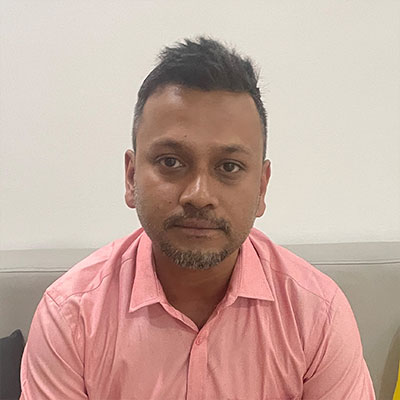
Heerak Jyoti Mahanta, joined us in May 2024, as a Senior Manager-MSME in our Delhi office.
He comes with more than 12 years of experience in the developmental sector. His expertise spans over a wide range of areas including gender and social justice, integrated natural resource management, enterprise development, women led federations, artisanal clusters and supply chain management. He has successfully executed projects funded by the UN, the GoI and PSUs like NHPC and HINDALCO.
Previously, he was associated with Foundation for MSME Clusters as a Senior Manager.
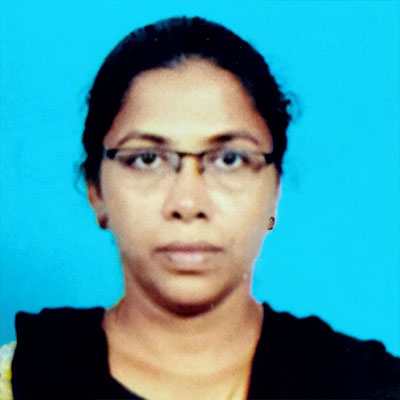
Revathy V
Field Coordinator - Ranipet, Tamil Nadu
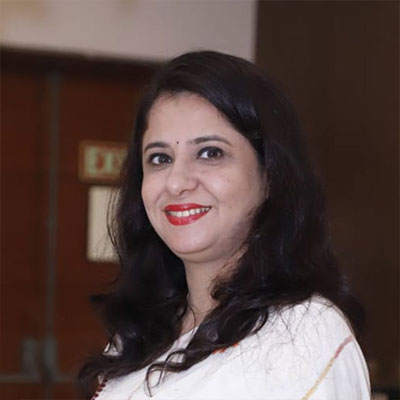
Pooja Khurana
Assistant Manager-Finance